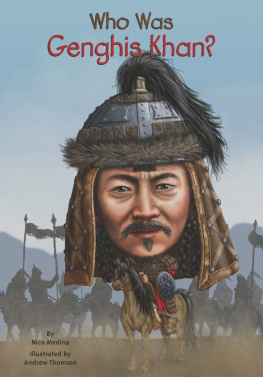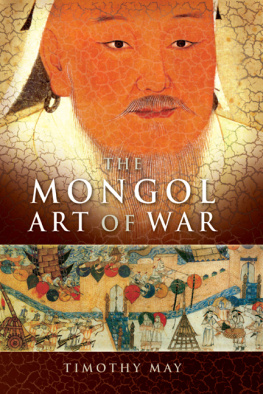Table of Contents
Acknowledgements
Series Editor Foreword
Preface
- Chinggis Khan as Child (1162-1182)
- Chinggis Khan as Temjin (1182-1187)
- The Rise of Chinggis Khan (1196-1206)
- Creation of the Yeke Monggol Ulus
- The Campaigns of Chinggis Khan (1205-1227)
- Family Matters
- The Art of War
- Wit and Wisdom
- Chinggis vs. Genghis
- Legacy of Chinggis Khan
Note on Sources
Suggested Reading
About the Author
Afterword
A Note on the Type
Acknowledgements
There are a number of people to whom I owe a debt of gratitude. One is Harold Lamb, whose Genghis Khan and the Mongol Horde I discovered one day in the elementary school library in fifth grade. Since then, my interest in the Mongols has only grown. I thank Scott Jacobs for his support of my research and to a number of people (Paul D. Buell, Michael Hope, and Anne Broadbridge) who read earlier drafts of this manuscript. Any errors remain my own. I must also thank Charly Carlini who invited me to write this book. I would be remiss not to acknowledge my parents who always encouraged my curiosity and education and who, not long after reading the aforementioned book, wisely told me No, when I asked for a pony while holding my archery equipment as a child. Finally, to my family who still puts up with me, my Mongol-mania, and who also wont let me have a pony.
This book is dedicated to the memory of Tom Allsen, whose scholarship has been so instrumental to all who venture into the Mongol Empire, and to the memory of Peter M. Garite. Both robbed of too many years.
Series Editor Foreword
Preface
Simply Chinggis. A rather odd title and a slogan that could be part of a vodka advertising campaign as Chinggis Khan does indeed have his own vodka brand. On the surface, it seems an unlikely title for a book about the Mongolian conqueror. Why not Simply Chinggis Khan? Or Simply Temjin? After all, Chinggis Khan is a title, but the man who used that particular sobriquet was known throughout his childhood and early adulthood as Temjin, named after a rival Tatar chieftain that Temjins father Yesgei defeated and captured on the day of his sons birth.
For one thing, no one would buy a book called Simply Temjin, except perhaps out of idle curiosity as to learn whom Temjin might be---particularly if the cover of book lives up to the standards of the others in this series. Indeed, the only people who know Temjin in casual conversation would be those who have read a book on Chinggis Khan.
So why not Simply Genghis Khan?the name that is often used popularly for the Mongolian conqueror. The simple reason is that this author is adamantly against using the G-word and has taught legions of students to castigate those who use it. Furthermore, as my son was gently reprimanded after correcting his world history teacher when the teacher uttered the G-Word, I should hold up my end of the bargain and not blaspheme. There are other valid reasons as well, which should please the publisher who raised his own concerns about not using the dreaded G-word. These reasons will be divulged in a later chapter. Until then, I shall trust that the reader will make the adjustment without incident while reading in anticipation of this revelation.
So we remain with the question of why Simply Chinggis and not Simply Chinggis Khan. The latter would transgress the practice of the series. Although Chinggis is not a proper name, Simply Chinggis is actually quite appropriate as it indicates much about the character of Chinggis Khan. Khan itself means king, lord, or ruler. Chinggis, however, describes that ruler. While it was once thought to mean oceanic, scholars are quite certain that it actually means fierce, firm, or resolute. All three of these adequately describe Temjin as a ruler. Thus, Simply Chinggis is truly an adequate and accurate title. It is a summary of his life, his character, and why Chinggis Khan is arguably the most important person in the last millennium. It is hoped that the reader will find this as a suitable introduction to explore the life and times of Chinggis Khan and the Mongol Empire.
Chapter 1
Chinggis Khan as Child (1162-1182)
On August 18, 1227, Chinggis Khan lay sweating from a fever in his bed. Almost 65 years old, the Mongolian conqueror may have wished he slept in the cooler climate of northern Mongolia. Perhaps one of his grandchildren or wives could have cooled his brow with a cloth soaked in the water from the Onan-Kerulen River Basin in which Chinggis Khan was born and served as the cradle of the Mongol Empire, an empire that only existed due to the efforts of the man wracked with fever and far from home.
At the time of his death, Chinggis Khan was in Xi Xia, a kingdom, located on the frontiers of Mongolia in what are now Ningxia and Gansu provinces in the Peoples Republic of Chinaa kingdom that his armies proceeded to wipe off the face of the earth. Originally, Xi Xia had submitted to him in 1209, but in 1223-1224, the rulers rebelled while he was far away. Additionally, his second in command had recently died. If there was a time to rebel, this was the moment.
Chinggis Khan attempted to resolve the matter diplomatically, but failed. At this time, he realized that Xi Xia would never fully accept Mongol rule as long as its own ruling family existed, although the Mongols had not occupied the region in 1209 but rather agreed to accept tribute. With no other recourse but war, the Mongols invaded in 1226. Neither army nor fortresses could halt the Mongol advance, yet, the Tangut nearly escaped destruction. Taking a break from the campaign, the now elderly Chinggis Khan went hunting. When some qulan or wild asses suddenly emerged from the brush, his startled horse reared and flung the Mongol leader. The fall did not kill him, but he suffered internal injuries. Although his generals and sons attempted to persuade him to cease the campaign. He refused, telling them not to stop until Xi Xia had been maimed and tamed and to not cease even if he died. The question was which would expire first, Chinggis Khan or Xi Xia?
In the meantime, his generals, his family, and perhaps even he himself, had the opportunity to reflect on the life of Chinggis Khan and how a boy from an obscure tribe in a remote region conquered the largest amount of territory in history, dwarfing the exploits of Cyrus the Great, Alexander the Great, and the future Napoleon. It formed the basis of the largest contiguous empire in history; exceeded only in total landmass by the British Empire, which was not contiguous and involved claiming the submission of kangaroos and moose. Conquest and military force alone are insufficient for empire building. It also requires genius; of that, Chinggis Khan had plenty, but his genius would have been wasted if he had not learned valuable lessons from his lifes experiences.
History reveals that Chinggis Khans childhood was difficult, and it undoubtedly shaped many of his beliefs and core values. Then again, who doesnt experience challenges? How we respond to them often becomes a defining character trait. In many ways, Chinggis Khans life was one of rags-to-riches on an unimaginable scale. He had what some might consider a well-rounded dysfunctional childhoodthe murder of his father, ostracism and abandonment, poverty, fratricide, captivity and enslavement, robbery. And all before the age of fifteen. If Chinggis Khan had not risen to these challenges, you would not be reading this bookany one of these could have erased the child Temjin from history. Yet persevere he did.


![Timothy May - The Mongol Empire [2 Volumes]: A Historical Encyclopedia](/uploads/posts/book/143064/thumbs/timothy-may-the-mongol-empire-2-volumes-a.jpg)

